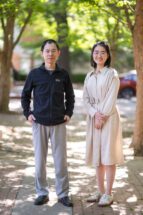Clemson University engineers have unlocked a new way to improve the performance of smart systems and artificial intelligence by enhancing distributed optimization, a crucial aspect of many advanced technologies such as smart grids and self-driving cars.
Yongqiang Wang, an associate professor of electrical and computer engineering, and Ph.D. student Yanan Bo reported their findings in the Proceedings of the National Academy of Sciences.

Distributed optimization is like teamwork for computers, with different devices working together to solve complex problems. However, a common issue in this process is getting stuck at what’s known as “saddle points,” which can slow down or even derail the optimization process.
The Wang-Bo team found a solution using “quantization,” a necessary step in digital communication. Quantization condenses data to save time and energy.
While most scientists saw quantization as a hurdle, Wang and Bo discovered it could be used to dodge saddle points. By tweaking the quantization process, they developed a method that helps computers avoid these obstacles and find better solutions faster.
“We came up with an approach that can address the saddle point problem without extra cost,” Wang said.
The breakthrough holds the promise of helping systems such as smart grids and self-driving cars work more efficiently, saving time and resources. Plus, it’s a potential game-changer for AI, allowing machines to learn from massive amounts of data more effectively.
Wang and Bo reported their findings in an article titled, “Quantization avoids saddle points in distributed optimization.” It was the only applied mathematics research article in the April 23 edition of the Proceedings of the National Academy of Sciences.
Get in touch and we will connect you with the author or another expert.
Or email us at news@clemson.edu

